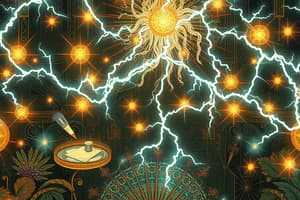Podcast
Questions and Answers
What is the fundamental property of an electric field?
What is the fundamental property of an electric field?
- It is a force that acts on charged bodies.
- It is a property of the space around a charged body. (correct)
- It is a type of electromagnetic radiation.
- It is a vector quantity that only affects conductors.
What happens when a neutral object is placed near a charged object?
What happens when a neutral object is placed near a charged object?
- The neutral object remains unchanged.
- The electric field of the charged object forces the electrons of the neutral object to oscillate.
- The neutral object becomes charged with the same polarity.
- The neutral object becomes charged with the opposite polarity. (correct)
What is the role of the electric field in the charging process by induction?
What is the role of the electric field in the charging process by induction?
- It has no role in the charging process by induction.
- It attracts or repels the electrons of the neutral object, depending on the field's polarity. (correct)
- It creates a magnetic field that induces a charge in the neutral object.
- It heats up the neutral object, causing it to become charged.
What happens when a charged object is grounded during the charging process by induction?
What happens when a charged object is grounded during the charging process by induction?
What is the speed at which the forces of an electric field are transmitted?
What is the speed at which the forces of an electric field are transmitted?
What is the result of charging an object by contact with a charged object?
What is the result of charging an object by contact with a charged object?
What determines the direction of electron movement during charging by contact?
What determines the direction of electron movement during charging by contact?
What is the relationship between the intensity of the force and the distance between charged objects?
What is the relationship between the intensity of the force and the distance between charged objects?
What is the result of charging an object by friction with a different type of matter?
What is the result of charging an object by friction with a different type of matter?
What is the electrostatic series related to?
What is the electrostatic series related to?
What happens when a charged object touches a neutral object quickly, resulting in an electric shock?
What happens when a charged object touches a neutral object quickly, resulting in an electric shock?
Study Notes
Charging an Object
- An object with an excess of electrons is NEGATIVE
- An object with a loss of electrons is POSITIVE
- An object with the same number of protons and electrons is NEUTRAL
Transferring Electric Charges
- There are three ways to transfer electric charges: Friction, Contact, and Induction
Charging by Friction
- Objects made of different types of matter are rubbed together, producing a static net charge on each object
- Matter with a greater affinity for electrons will gain electrons and become negative
- Matter with a lesser affinity for electrons will lose electrons and become positive
Charging by Contact
- Charging by contact occurs when a charged object touches a neutral object
- Electrons move to balance the charges, spreading out towards the object with the least number of electrons
- The charged object acquires the SAME charge as the originally charged object
- The result can be an electric shock!
Charges and Electric Fields
- A charge on an object indicates an imbalance in the number of charges (+ and -)
- The intensity of the force depends on the quantity of charges on the object
- The intensity diminishes with distance, similar to gravity
- Electric fields:
- Are a property of the space around the charge
- Transmit the force felt by objects around a charged body
- Are stronger with stronger charges and vice versa
- Transmit forces at the speed of light
Charging by Induction
- A charged object can transfer a charge to a neutral object without touching it
- Only conductors can be charged through induction
- The electric field of the charged object forces the electrons of the neutral object to move
- If the field is negative, electrons repel; if the field is positive, electrons attract
- The result is the separation of an induced charge
- If there is a ground, electrons can move in or out of the object, changing the balance and charging the object
- The resulting charge is OPPOSITE to the originally charged object
Studying That Suits You
Use AI to generate personalized quizzes and flashcards to suit your learning preferences.
Description
Learn about the basics of electric charges, how objects can be charged, and the different methods of transferring electric charges. Understand the concept of positive, negative, and neutral charges, and how friction, contact, and induction can affect electric charges.




